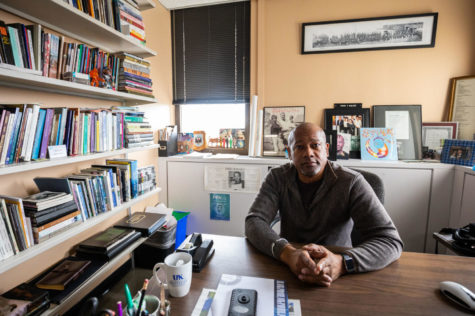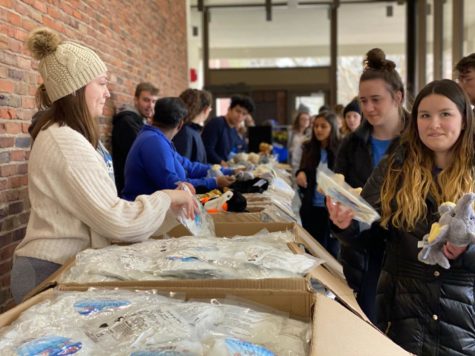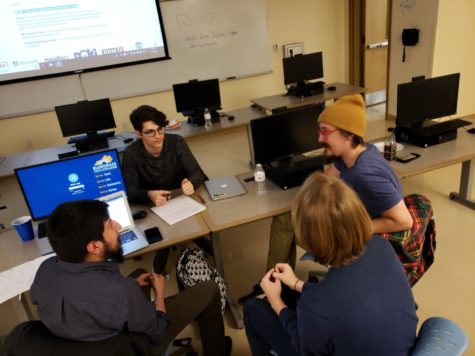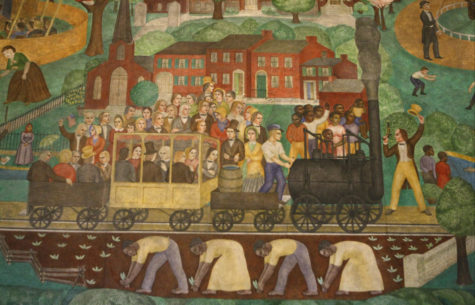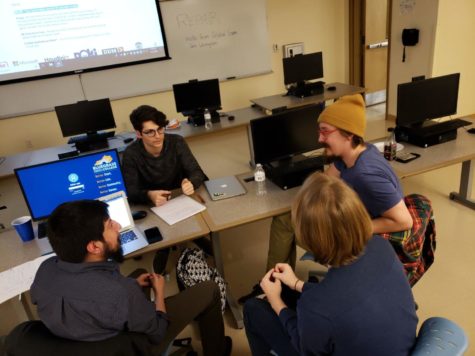Coexisting is key: Religions on UK’s campus help unite students
Ten members of the UK and Lexington communities took part in a prayer during the event held in solidarity with UK’s Jewish community on Thursday, January 25, 2018 at the Jacobs Science Building on UK’s campus in Lexington, Ky. Photo by Arden Barnes | Staff
April 23, 2019
On a campus with over 500 student organizations, the University of Kentucky has 23 organizations with a religious or spiritual self-designation that are registered with the Office of Student Organizations and Activities. Though many of these religious organizations, more than 15, are demonstrative of mainstream Christian religions, there are student organizations that are representative of the other diverse student religious factions on campus.
Yet, student religion at the University of Kentucky is anything but a competitive numbers game. Regardless of the number of student members in each organization, campus religious groups provide an opportunity for fellowships and connection between students of similar religious beliefs. Involved students report growing alongside other believers while they grow in their own religious faith.
“It’s [being involved in the Muslim Student Association] given me the perspective to understand how the Islamic faith is wholly an individual relationship between the Muslim and God, and that this relationship has very real implications in the community in which you live,” said Hina Iqbal, a senior neuroscience major and the current Halaqa Chair on the board for the Muslim Student Association. “I’ve had the opportunity in my time as an MSA student to learn and grow, inspired by a faith I hold very close to my heart.”
Halaqa, according to Iqbal, translates to “a gathering to talk and learn more about Islam and the Quran.” During these gatherings, Iqbal said that students explore Islam’s encouragement of community service and engagement, the purpose of intentional goal setting for the year ahead and what a relationship with the Quran looks like.
Founded at UK in 1971, and with 30 to 40 active committee members and more students who attend MSA sponsored events, the Muslim Student Association serves as a space of belonging for Muslim students, encouraging self-exploration and self-development. They offer monthly general body meetings and halaqas, social events and Islamic Awareness Week.
“MSA ultimately strives to be a space to bolster individual strength through self-education and involvement and, in doing this, share this strength with the people around us,” Iqbal said.
Another popular religion among the UK student population is Judaism. The Jewish Student Center, supported by Chabad, the largest Jewish organization in the world, services nearly 200 students each semester. The center, established in the fall of 2015, hosts Sabbath and Holiday meals, and is the only source on campus for Kosher food, religious observances and Jewish education.
Chabad, which has been doing programs at UK for over 35 years, has chapters in over 100 countries, all 50 U.S. states and hundreds of universities.
“Based on the philosophy of the Lubavitcher Rebbe, Rabbi Menachem Mendel Schneerson, a leader of world Jewry, Chabad spreads a message of love for every single Jew,” said Shlomo Litvin, the rabbi at the Jewish Student Center.
While it is the center’s goal to extend this love to their involved students, it is the Jewish Student Center that received an outpouring of love from other student groups on campus when their building was vandalized in January of 2018. Nearly 200 people met at the Jacobs Science Building to discuss prejudice against the Jewish community.
“While there was no official response from the university, we were very touched by the response from various student groups who reached out and expressed support, as well as the students who came out for our unity event the following week,” Litvin said.
Litvin said that even though anti-Semitism is a growing problem in America and at UK, the majority of the campus community seems to be fair-minded and supportive.
Moments like the unity event help to eliminate hate against religious groups on campus and attempt to foster unity between students of various backgrounds. Coexisting is key, and Litvin said that it is possible, no matter one’s religious affiliation.
“Regardless of our backgrounds or faiths, all of us have much more that unites us than that which divides us,” he said.
Iqbal agreed that recognizing our similarities, not our differences, is what makes a difference.
“Remembering is an active process, and so we need to more actively and intentionally remember, on individual levels, as well as organizational levels, that we are more alike than we are different. And that those uncomfortable spaces that scare you at first suddenly aren’t as discomforting once you’re there,” she said.
Iqbal said she believes that religious identities may differentiate students from others, causing each to flock to their own communities, many of which will be subjected to unjust stereotyping. This, she said, is the result of ignorance. The positive of that? Ignorance can help you grow.
“Take ignorance as a positive opportunity to learn and lean into discomfort. Attend events of faith communities you don’t belong to if that’s something you can do or ask about a friend’s experience if they did go to an MSA or other community event. Use your time in undergrad to surround yourself with people who will bring you out to events you otherwise wouldn’t have gone to,” Iqbal said.
Students interested in learning more about the students’ religious organizations on campus may visit https://uky.campuslabs.com/engage/ or meet with advisers in the Office of Student Organizations and Activities.










































































































































